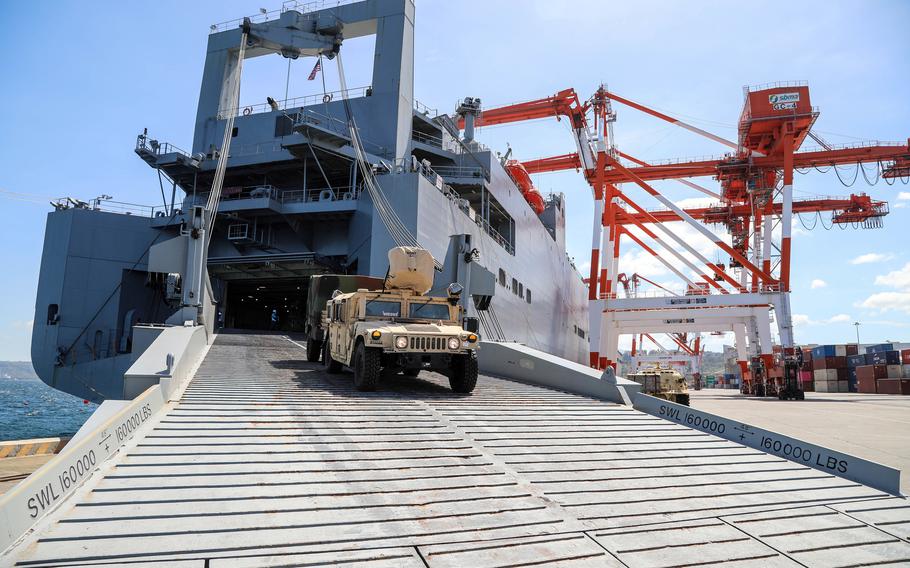
Military vehicles from the 402nd Army Field Support Battalion are downloaded from the USNS Red Cloud at Subic Bay, Philippines, Feb. 24, 2022. (Kevin Martin/U.S. Army)
The U.S.-based private equity firm Cerberus Capital Management has completed its purchase of the Subic Bay shipyard in the Philippines, laying to rest concerns of a possible sale to interested Chinese companies.
“The completion of the Subic Bay shipyard will redound to benefits for the country, bring jobs to the local communities, increase economic activity, and at the same [time] fortify our strategic security measures,” Jose Manuel Romualdez, Philippine ambassador to the United States, said in a news release Thursday.
“Working with the United States on this project will help ensure that we are able to protect our interests not only for our country but the whole region,” he said.
The sale of the former U.S. Navy base is an “important example of U.S.-Philippine public-private partnership,” Ely Ratner, assistant secretary of defense for Indo-Pacific security affairs, said in a tweet Wednesday.
“Great to see the completion of the acquisition of Hanjin shipyard in Subic Bay by a U.S.-based firm,” he wrote.
The date and purchase price of the sale were not included in the news release. Agila Naval Inc. will operate the shipyard, according to reports last month in Philippine media. Further information on Agila was unavailable Friday.
Reuters reported last month that Cerberus was buying the shipyard for $300 million. Cerberus did not respond Thursday to a request for comment from Stars and Stripes.
Several Chinese companies were among eight parties that expressed interest in 2019 in buying the shipyard, which holds strategic importance because of its deep-water port and proximity to the contested South China Sea.
The Subic Bay shipyard had been operated by Hanjin Philippines, a South Korean firm that defaulted on loans of $1.3 billion in 2019, according to Reuters. Hanjin’s shipbuilding activity employed about 20,000 workers.
Cerberus, based in New York, has approximately $55 billion in assets in credit, private equity and real estate, according to its website. A potential partner in the deal, Australian shipbuilder Austal, was not involved in the final agreement and is no longer a tenant at the shipyard, according to a March 9 report in Maritime Executive.
The purchase by a U.S. firm represents a full circle in American-Philippine military relations.
The U.S. occupied the Philippines in 1898 after defeating Spain in the Spanish-American War.
Naval Base Subic Bay and the nearby Clark Air Force Base became key strategic hubs for the U.S. through the end of combat operations in the Vietnam War in 1973.
A growing tide of Philippine opposition to America’s military presence — as well as the cataclysmic eruption of Mount Pinatubo in 1991 that decimated Clark — led the U.S. to leave both bases by the end of 1992.
The two countries, however, have continued bilateral training exercises in the decades since then.
That military relationship has become more crucial in recent years as the Philippines and China have clashed over competing claims of sovereignty on portions of the South China Sea.